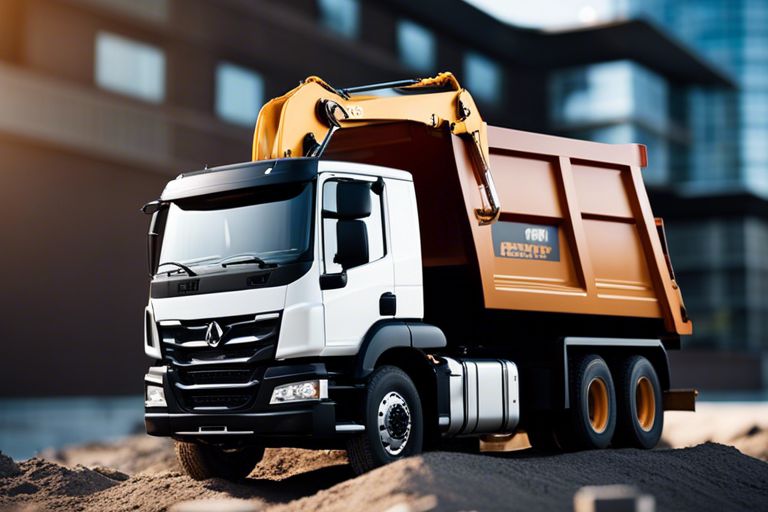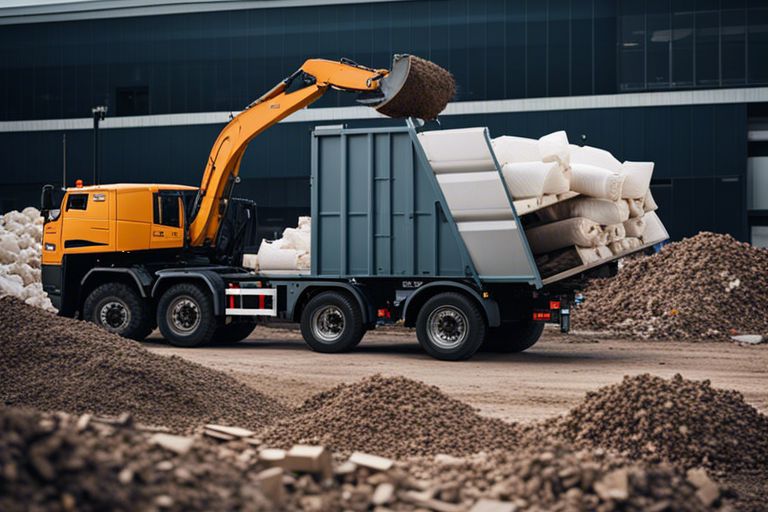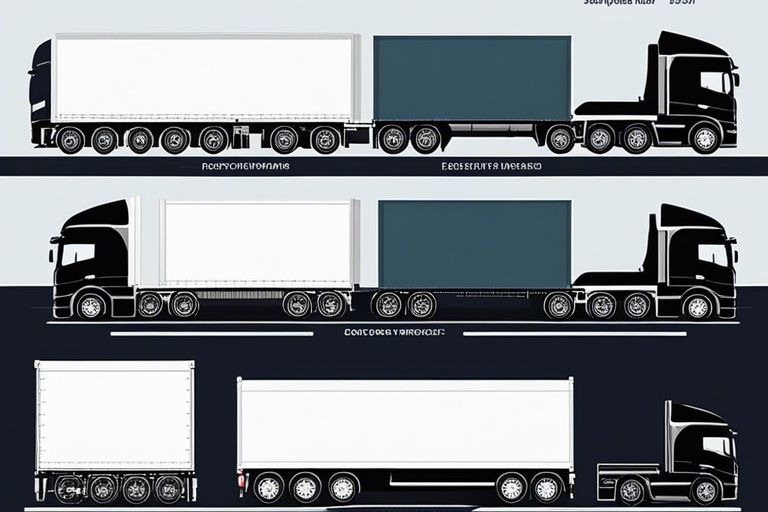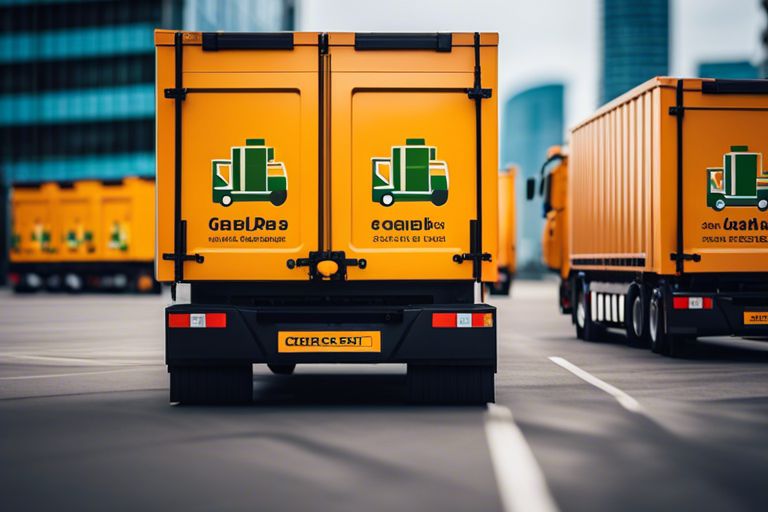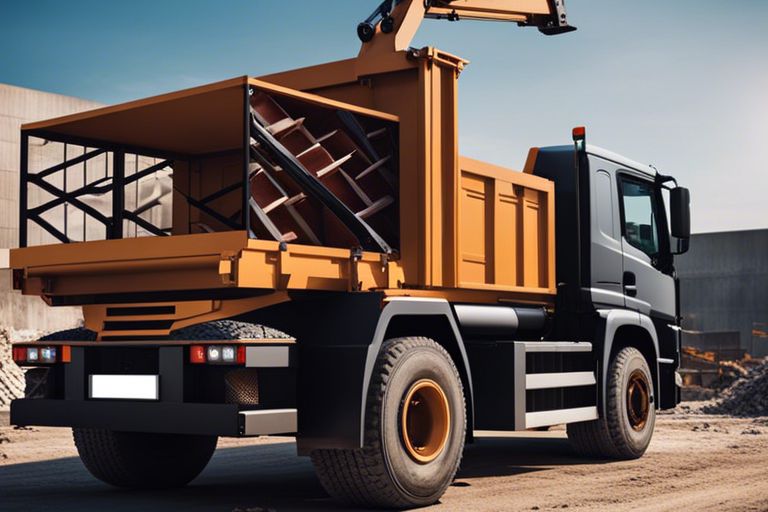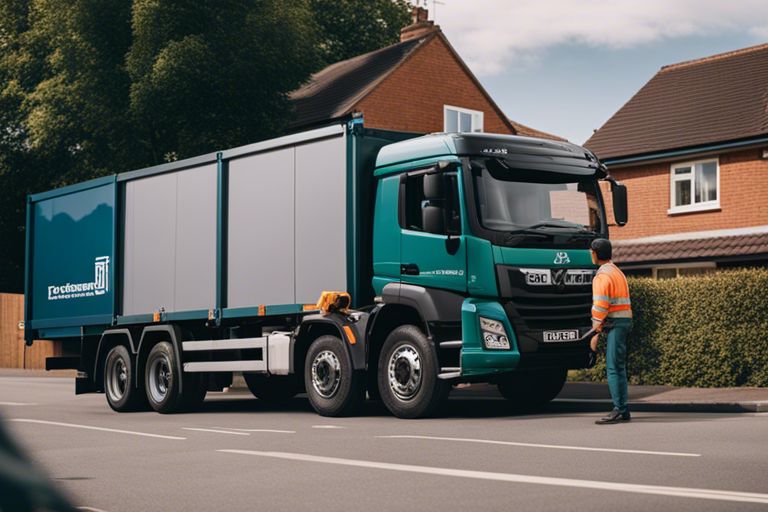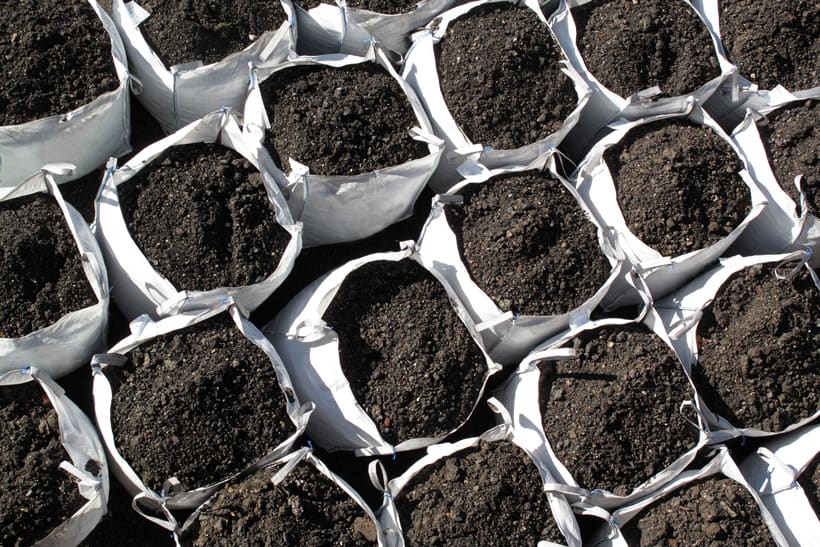Are you looking to effectively and safely remove waste from your property? Proper waste removal is essential for maintaining a clean and healthy environment. In this comprehensive guide, we will provide you with expert tips on how to prepare for a smooth waste removal process. From understanding local regulations to choosing the right waste removal company, we will cover all the essential steps to ensure a hassle-free experience. Whether you are managing household waste or commercial waste, this guide will equip you with the knowledge and tools needed to simplify the waste removal process and avoid any potential hazards or complications.
Key Takeaways:
- Proper Segregation: Ensure that waste is properly segregated into different categories such as recyclable, non-recyclable, hazardous, and organic waste before the removal process.
- Communication with Waste Removal Service: Establish clear communication with the waste removal service provider to inform them about the type and quantity of waste to be removed, as well as any specific requirements or restrictions.
- Schedule Regular Removals: Regularly schedule waste removals to prevent accumulation of waste, maintain a clean environment, and comply with local waste management regulations.
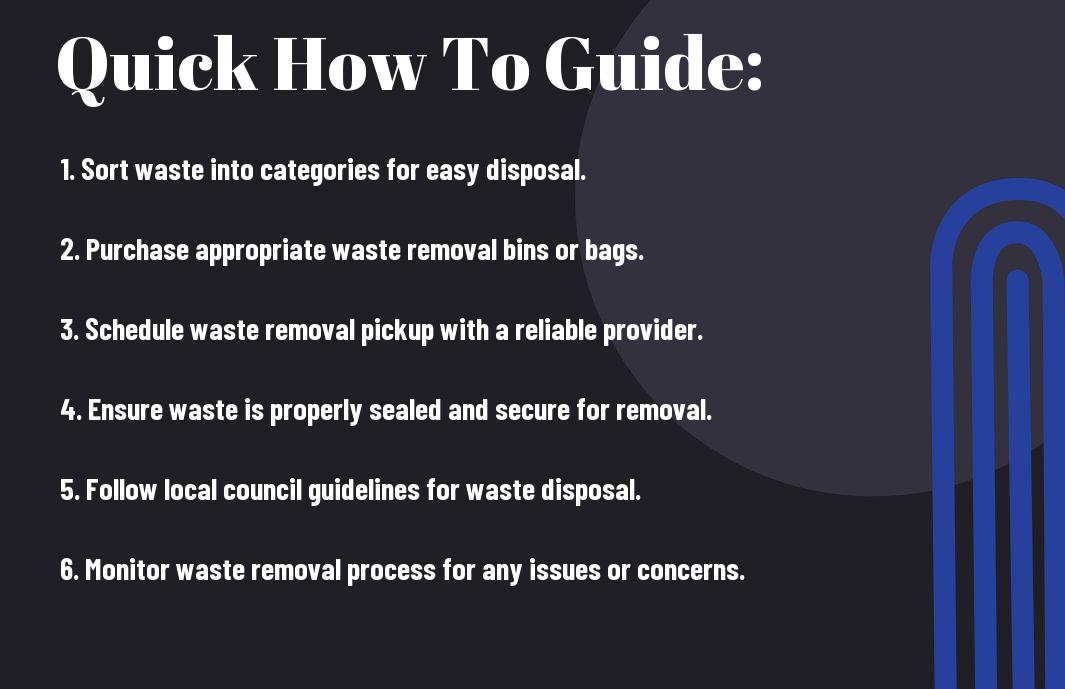
Planning Your Waste Removal Strategy
When it comes to waste removal, having a solid strategy in place is essential for a smooth and efficient process. Without proper planning, businesses can face costly delays and potential environmental hazards. To help you get started, we recommend reviewing the Managing and Reducing Wastes: A Guide for Commercial Buildings provided by the Environmental Protection Agency as a comprehensive resource for waste management.
Factors to Consider Before Starting
Before embarking on your waste removal journey, it’s important to carefully assess the type and quantity of waste your business produces. Consider the hazardous nature of certain materials and the potential health and safety risks associated with handling them. Additionally, compliance with local regulations and environmental laws should be a top priority. After evaluating these factors, you can develop a tailored waste removal plan that addresses any risks and challenges specific to your business.
Creating a Waste Removal Timeline
Establishing a waste removal timeline is crucial for maintaining order and efficiency. Identify key milestones such as collection dates, processing deadlines, and delivery schedules to ensure that waste is managed in a timely manner. By creating a clear timeline, you can also allocate resources effectively and minimise disruption to your daily operations. After implementing a well-defined timeline, your business can benefit from streamlined waste removal processes and improved sustainability practices.
For more in-depth guidance on creating a waste removal timeline and other waste management strategies, the Managing and Reducing Wastes: A Guide for Commercial Buildings provides valuable insights and best practices for businesses of all sizes.
Practical Tips for Waste Segregation and Sorting
When it comes to waste removal, proper waste segregation is key. By sorting your waste into different categories, you can ensure that each type is disposed of in the most appropriate manner. Here are some practical tips to help you with waste segregation:
- Identify different types of waste such as recyclable and non-recyclable materials.
- Label your bins or containers clearly to indicate the type of waste they should contain.
- Set up a designated area for different types of waste to facilitate easy sorting.
- Educate everyone in your household or workplace about the importance of waste segregation.
The implementation of these practical tips can significantly improve the efficiency of the waste segregation and sorting process.
How to Properly Separate Recyclable and Non-Recyclable Waste
When segregating waste, it is crucial to properly separate recyclable and non-recyclable materials. Start by clearly identifying which items can be recycled and which cannot. Use separate containers or bags for each type of waste, and ensure that recyclable materials are clean and free from any contamination. The proper separation of recyclable and non-recyclable waste is vital to ensure that materials are sent to the appropriate facilities for disposal.
Special Handling for Hazardous Materials
Some types of waste, such as hazardous materials, require special handling due to their potential dangerous nature. Examples of hazardous waste include chemicals, batteries, and electronic equipment. It is important to separate these materials from general waste and dispose of them in accordance with local regulations. The improper disposal of hazardous materials can have negative consequences for the environment and human health.
Proper handling and disposal of hazardous waste is crucial to prevent contamination and pollution. If you are unsure about how to handle specific hazardous materials, seek professional advice or engage the services of a licensed waste management company.
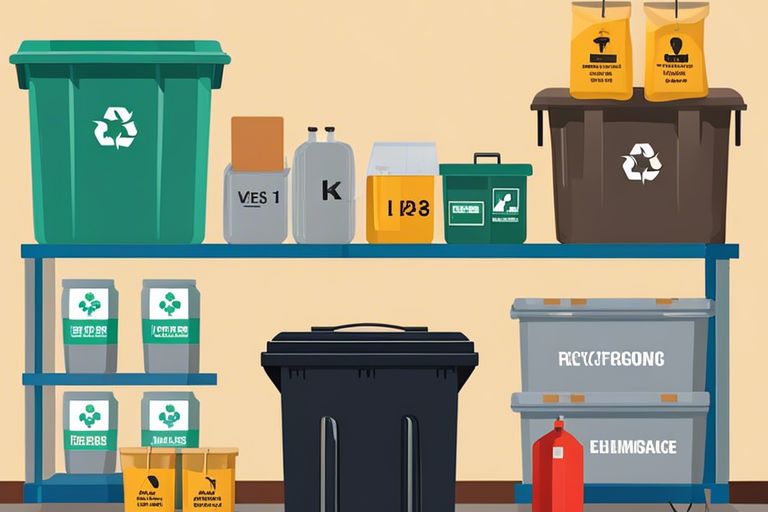
Organising Logistics for Waste Collection and Disposal
When preparing for a smooth waste removal process, it is essential to organise the logistics of waste collection and disposal in a systematic manner. This involves coordinating the pickup schedule, choosing the right waste removal service, and ensuring efficient waste pickup and transport.
Choosing the Right Waste Removal Service
Choosing the right waste removal service is crucial in ensuring a smooth waste removal process. It is important to select a reputable and licensed waste removal company that offers a range of services, including hazardous waste disposal and recycling options. Consider the company’s experience, reliability, and environmental credentials when making your decision. Ensure that the waste removal service follows all necessary regulations and safety protocols to prevent any potential harm to the environment and public health.
How to Ensure Efficient Waste Pickup and Transport
Efficient waste pickup and transport are essential for a smooth waste removal process. When scheduling waste pickup, make sure to provide accurate information about the type and quantity of waste to be collected. Proper packaging and labelling of hazardous materials is crucial to prevent any accidents during transport. Additionally, consider the proximity of the waste disposal site to minimise transportation costs and reduce the environmental impact. Regular maintenance of vehicles and adherence to road safety regulations are also important factors to consider for efficient waste transport.
By following these steps, you can ensure that the waste pickup and transport process is carried out in a safe and efficient manner, minimising the risk of potential environmental hazards or health concerns associated with improper waste disposal.
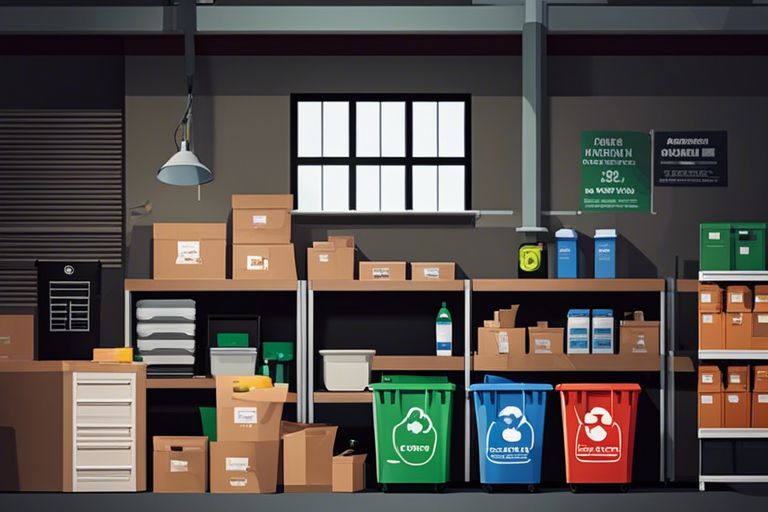
Maintaining a Smooth Waste Removal Process
When it comes to waste removal, maintaining a smooth process is essential for both environmental and health reasons. Proper waste management not only keeps our surroundings clean and safe, but also contributes to the overall well-being of the community. In this chapter, we will discuss strategies for regular waste management and troubleshoot common waste removal problems to ensure a seamless waste removal process.
Strategies for Regular Waste Management
Implementing a regular waste management schedule is crucial for maintaining a clean and safe environment. This involves segregating waste into different categories, such as organic, recyclable, and hazardous, and disposing of them accordingly. It is also important to educate and encourage the community to reduce, reuse, and recycle their waste to minimise the impact on the environment. Regular waste audits and reviews of waste collection methods can help identify areas for improvement and ensure efficient waste management.
Trouble-Shooting Common Waste Removal Problems
Common waste removal problems such as overflowing bins, missed collections, and improper waste segregation can disrupt the smooth waste removal process. To address these issues, it is essential to communicate with waste management services or local authorities to report and resolve any problems. Additionally, educating the community on the proper waste disposal practices and providing clear instructions for waste separation can help prevent common waste removal problems.
By being proactive in addressing and resolving common waste removal problems, we can ensure a safer and cleaner environment for everyone. It is important to take action and seek support from waste management authorities to overcome these challenges and maintain an efficient waste removal process.
How to Prepare for a Smooth Waste Removal Process
In conclusion, proper preparation for waste removal is essential for a smooth and efficient process. By following the guidelines provided by your local waste management authorities, such as the ones outlined by Garbage, Recycling, and Yard Waste Preparation, you can ensure that your waste is disposed of responsibly and without any disruptions. Sorting your waste, using the correct containers, and scheduling pick-ups in advance are all crucial steps that can make a significant difference in the waste removal process. By taking these measures seriously, you can contribute to a cleaner environment and a more efficient waste management system for your community. It is important to be proactive and responsible when it comes to waste disposal, and by doing so, you can help make the process as smooth and hassle-free as possible for everyone involved.
FAQ
Q: Why is it important to prepare for waste removal?
A: Proper preparation ensures a smooth and efficient waste removal process, minimising any inconvenience and reducing the risk of delays or complications.
Q: What are the steps to prepare for waste removal?
A: The first step is to categorise and separate the different types of waste. Then, ensure that all waste is properly contained and labelled according to local regulations. Finally, schedule the waste removal with a reputable and licensed waste management company.
Q: What are the consequences of not properly preparing for waste removal?
A: Failure to prepare can result in delays, fines, or even the rejection of waste by the removal company. This can lead to a build-up of waste on site, posing health and safety risks, and causing potential harm to the environment.
Q: How can I ensure that my waste removal process is environmentally friendly?
A: By properly preparing waste for removal, you can ensure that it is disposed of in an environmentally friendly manner. This includes recycling and reusing materials whenever possible, and ensuring that hazardous waste is handled and disposed of correctly.
Q: What should I look for in a waste management company?
A: When choosing a waste management company, ensure they are licensed, have a good reputation, and are committed to environmentally responsible waste disposal. It is also important to consider their capability to handle the specific types and volumes of waste generated by your organisation.

